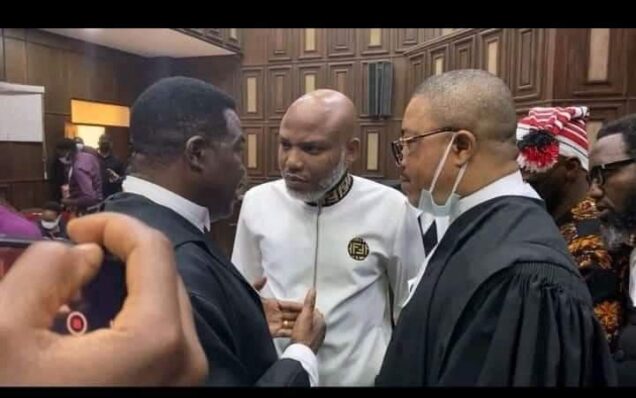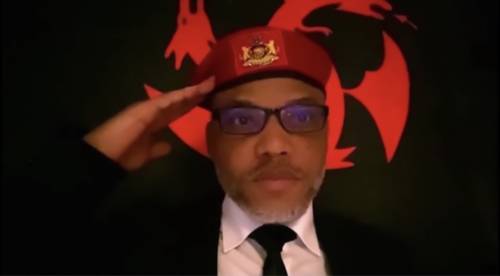Headlines
Massacre As Gunmen Kill Five, Abduct Many in Zamfara Mosque Attack

Gunmen attacked a Friday congregational mosque killing five worshippers and abducting many others in Maru Local Government Area of Zamfara State, police and residents said.
Residents said the incident happened at Dutsen Gari community of Kanoma District of Maru. They said dozens of militants wielding sophisticated weapons arrived the community on motorbikes, shooting to scare and kill.
The attack occurred a few days after Zamfara governor, Bello Matawalle, welcomed the deployment of over 2000 special police constabulary drafted to the state to reinforc security in vulnerable communities.
Residents said the gunmen arrived the community when the locals were at the mosque attending Juma’at prayer
They invaded the mosque dispersing the congregants and abducting over 40 persons including the Imam, a resident said, asking not to be named for security reasons.
He said many of the residents fled to the bush with bullet wounds and later returned from their hiding before going for treatment after the gunmen had left with many other congregants.
”The gunmen, on their way to Dutsen Gari community, freely attacked neighboring communities, rustled livestock and killed many before reaching our community unchallenged,” he said.
The police in Zamfara said the gunmen earlier disguised as congregants in the mosque and later dispersed residents with gunshots killing five of them
The police, however, said only 18 persons were abducted.
The police spokesperson in Zamfara, Muhammad Shehu, told reporters that two persons died instantly following the gunshots while three others died while receiving treatment in the hospital.
Police officers have been drafted to the area to trail the fleeing bandits, the spokesperson added.
Zamfara is one of the North-west states affected by repeated bandit attacks. Others include Kaduna and Katsina.
Apart from killing residents, the gunmen reportedly kidnapped many for ransom.
Premium Times
Headlines
Court Adjourns Nnamdi Kanu’s Defence Till October 27

The Federal High Court in Abuja has adjourned the trial of the detained leader of the Indigenous People of Biafra, Nnamdi Kanu, till Monday, October 27, to enable him to open his defence in the terrorism charges filed against him.
Justice James Omotosho fixed the new date on Friday, after Kanu informed the court that his former legal team, led by former Attorney General of the Federation and Minister of Justice, Chief Kanu Agabi (SAN), had yet to release his case file to him.
At the resumed hearing, Adegboyega Awomolo (SAN) appeared for the Federal Government and reminded the court that the matter was fixed for Kanu to begin his defence as earlier directed.
However, no counsel represented Kanu.
He pleaded for an adjournment to allow him to retrieve and study the file to prepare adequately for his defence.
He said, “My lord, my counsel left the case yesterday, and I have not received the file from them.”
He also informed the court of his intention to call 23 witnesses, both local and foreign, and requested an order directing the Department of State Services to allow his foreign witnesses access to him.
Additionally, he sought permission for his lawyers to visit him on non-working days — a request Omotosho granted.
Counsel to the Federal Government, Awomolo, however, described Kanu’s complaint as “strange”, noting that the defendant had spent hours in court with his former lawyers. He further urged the court to strictly enforce its earlier directive giving Kanu six days to open and close his defence.
The prosecution said, “I’m aware that there is a standing order for the defendant to defend himself within six days. The defendant wasted yesterday. This is the second day, my lord. I urge your lordship to keep to the standing order of the number of days given to the defendant,” Awomolo said.
In his ruling, Omotosho said while Kanu’s claim about the withheld case file was “strange and difficult to believe”, he would still grant a short adjournment in the interest of justice.
The judge cautioned against unnecessary delays, stressing that several other cases had been affected by the protracted proceedings.
The matter was subsequently adjourned to Monday, October 27, for Kanu to open his defence.
Headlines
Trump Pardons Binance Founder Zhao after Conviction for Money Laundering

US President, Donald Trump, has pardoned Binance founder Changpeng Zhao, the billionaire who built the world’s largest cryptocurrency exchange and later served prison time for compliance failures linked to money laundering and illicit activity.
The decision ends a months-long push by Zhao, known widely in the crypto world as “CZ”, to clear his record. The Binance founder has long been seen as one of the most influential figures in the digital asset space and a key supporter of the Trump family’s crypto ventures.
“Deeply grateful for today’s pardon and to President Trump for upholding America’s commitment to fairness, innovation, and justice,” Zhao wrote on social media on Thursday.
The case against Zhao
Zhao served a four-month sentence for violating the Bank Secrecy Act, becoming the first person ever jailed under the law, which requires financial institutions to verify customers’ identities and report suspicious transactions.
Prosecutors said Zhao’s violations were unprecedented, accusing Binance of facilitating more than 1.5 million illegal crypto trades worth nearly $900 million. Those transactions allegedly included dealings with sanctioned groups such as Hamas’ al-Qassam Brigades, al-Qaida, and Iran.
Judge Richard Jones, who oversaw the case, said Zhao’s refusal to comply with US banking rules allowed Binance’s explosive growth. Prosecutors cited Zhao telling employees, Better to ask for forgiveness than permission, when referring to the company’s approach to regulation.
“I failed here,” Zhao told the court during sentencing. “I deeply regret my failure, and I am sorry.”
Zhao’s rise is one of tech’s most striking rags-to-riches stories.
Born in rural China, he immigrated to Canada with his family after the 1989 Tiananmen Square crackdown. As a teen, he worked at McDonald’s before turning to tech in college.
He launched Binance in 2017, and within a few years, it had become a global powerhouse in digital finance.
White House defends pardon
White House Press Secretary Karoline Leavitt confirmed the pardon, saying the counsel’s office had thoroughly reviewed the request.
She accused the previous Biden administration of pursuing “an egregious oversentencing” and adopting a very hostile stance toward the crypto industry.
“President Trump wants to correct this overreach,” Leavitt said, drawing a clear contrast between the two administrations’ approaches to digital finance.
Trump’s move continues his pattern of using presidential clemency to aid political allies, public figures, and others convicted of controversial crimes.
Since taking office, the Trump administration has dropped several enforcement actions against crypto firms initiated under Biden and even dissolved a Justice Department unit focused on crypto-related crimes.
Trump and his sons have also embraced crypto. Their venture, World Liberty Financial, launched a dollar-backed stablecoin that gained early traction after an Abu Dhabi investment fund used $2 billion worth of the token to buy a stake in Binance.
Following news of Zhao’s pardon, the value of another Trump-linked token, World Liberty Finance’s secondary coin, surged sharply, outperforming every major cryptocurrency on Thursday, according to CoinMarketCap.
Headlines
Why I Listed Sanwo-Olu, Wike, Umahi, Military Chiefs, Others As My Witnesses – Nnamdi Kanu

Incarcerated leader of the Indigenous People of Biafra (IPOB), lNnamdi Kanu, has explained why he wants governors, ministers and former military chiefs among notable personalities he listed as witnesses in his terrorism case.
The IPOB leader, whose no-case submission was dismissed by Justice James Omotosho, is due to open his defence on the trial.
Ministers Nyesom Wike (FCT), David Umahi (Works), former Army chiefs Gen. Theophilus Danjuma and Gen. Tukur Buratai are among the 23 witnesses whose names were frontloaded by the IPOB leader.
Also listed as witnesses are Imo State Governor Hope Uzodinma, Lagos State Governor Babajide Sanwo-Olu, former Abia State Governor Okezie Ikpeazu, former Attorney General of the Federation, Abubakar Malami, Director-General of the Director of State Service (DSS) Oluwatosin Ajayi, his predecessor, Yusuf Bichi, and former Director General of the National Intelligence Agency (NIA) Ahmed Rufai Abubakar.
In a document filed on Wednesday, which he personally signed, Kanu prayed the court to extend the six days earlier granted him to conduct his defence to 90 days.
Justice Omotosho at the last hearing, granted his request for a private meeting with his team of lawyers on October 22 in the courtroom of the Federal High Court in Abuja, preparatory for today’s commencement of his defence.
In the document, Kanu categorised his witnesses into two: “ordinary, but material defence witnesses (voluntary) and “material and vital witnesses (to be summoned under Section 232 of the Evidence Act 2011).”
He also indicated his intention to testify in person.
According to the document, Kanu said he plans to call Wike “to testify on the Obigbo Massacre, following the EndSARS protests and the role of security forces under his authority.”
He said Uzodinma is “to testify on public statements, following Ahmed Gulak’s death and subsequent clarification exonerating IPOB.”
Kanu said he would be inviting Gen. Danjuma “to testify on his 2018 public warning, urging self-defence against infiltrated armed forces, contextualizing the defendant’s advocacy for self-defence.”
He said Buratai would “testify on the 2017 invasion of the defendant’s residence and the chain of command authorizing the military operation.”
Kanu said Sanwo-Olu will “testify on the findings of the Lagos State EndSARS Judicial Panel, particularly the Lekki Toll-Gate massacre, evidencing state patter of repression.”
Umahi is scheduled “to testify regarding the proscription of IPOB without judicial order and its consequences,” while Ikpeazu will “testify on his knowledge and administrative participation In the 2017 military invasion within Abia State.”
Kanu wants Malami “to testify on directives and authorizations connected with the defendant’s extraordinary rendition from Kenya in June 2021.”
Also, Ajayi is being invited “to clarify on his pubic lectures and statements on terrorists and invaders, relevant to interpreting the defendant’s own broadcasts.”
Kanu said Bichi should “testify on knowledge and authorization of rendition operations, custody conditions, and compliance with legal procedures.”
He said Abubakar is expected” to testify on the operational and diplomatic coordination of the rendition.”
Kanu said a DSS official, whose name he failed to disclose, will be invited “to be cross-examined regarding direct involvement in the defendant’s abduction and illegal transfer, fabrication of witness statements, and custodial abuses.”
Those he listed as ordinary witnesses include Chief Emeka Umeagbalasi, who he described as an “expert in political history and self-determination.”
According to the document, Umeagbalasi “will testify on the historical and legal context of self-determination movements (such as IPOB) and their treatment under Nigerian and international law, including extra-judicial killings of the defendant’s associates.”
Mazi Benjamin Madubugwu, an”associate of the defendant and former co-accused” is expected to “testify to the internal structure and objectives of IPOB, refuting claims that it is a terrorist organization.”
Chief Dan Ulasi, a community leader in Umuahia, Abia State, is being invited to “testify on the perception of the defendant’s broadcasts as political commentary rather than incitement.”
Bruce Fein, described as an international human rights and constitutional lawyer, based in Washington, D.C., United States, would “testify on the illegality of the defendant’s extraordinary rendition and its implications for jurisdiction and fair trial.”
Emeritus Professor Martin Aghaji, who Kanu said is his “treating physician,” is to “testify on the defendant’s medical condition, effects of detention, and fitness to stand trial.”
Barry Sutton, a “digital-security expert at the Massachussets Institute of Technology, Massachussets MA, USA, would “examine the integrity of the electronic evidence, including chain of custody, authenticity, and tampering issues.”
Chief Godwin I. Chionye, described as a “senior lawyer and community elder” from Isiama Afaraukwu Ibeku Umuahia, Abia State, is to “testify on the defendant’s good character and standing in his community.”
Prince Emmanuel Kanu of No. 1 Eze Okwu-Kanu Close, Umuahia, Abia State, described as an “eyewitness to the 2017 military invasion of the defendant’s residence,” is expected to “testify to the events, casualties, and use of excessive force by the army.”
Kanu said he will, in his testimony, provide “a sworn account of the facts, denying the allegations, and explaining the political context of his statements and actions.”
Part of the document reads: “Notice of number and names of witnesses to be called by the defendant and request for witness summons/subpoena and the variation of the time within which to defend the counts/charges against the defendant.
“Take notice that pursuant to the order of this honourable court made on the 16th day of October 2025, directing the defendant to commence his defence on the 24th day of October 2025, the defendant shall call a total of twenty three (23) witnesses, divided into two categories, viz:
*Category A – ordinary, but material defence witnesses (voluntary).
*Category B – vital and compellable witnesses (to be summoned under Section 232 of the Evidence Act, 2011).
“Given the materiality of the prospective evidence of the witnesses slated for the defence of the defendant, the time frame within which the defendant is ordered to present and conduct defence of the charges appears grossly inadequate, hence your lordship is urged to vary the timeframe and accommodate at least a period of 90 days for the defence.
“The Registrar of the of the court be ordered to issue subpoenas or witness summons on Category B witnesses or be permitted
“The defendant respectfully prays this honourable court to issue all necessary summonses and witness warrants under Sections 241-242 of the Evidence Act, 2011 and under the inherent jurisdiction
“The defendant undertakes to provide the sworn statements of all voluntary witnesses to this honourable court and to notify the prosecution within a reasonable time.
“The honourable court to note that the appearance of these witnesses is essential to ensuring a fair and complete determination of the issues before the court and the honourable court and the entirety of Nigeria will enjoy the robust evidence that would surface.
“No precious time of the honourable court would be delayed and it would interest the honourable court and the general public that justice is not only done but manifestly seen to have been done.”






